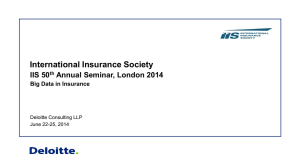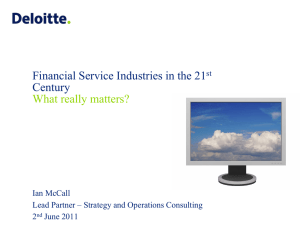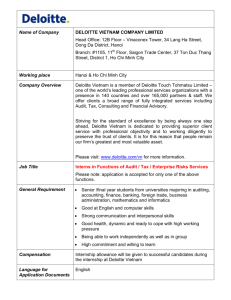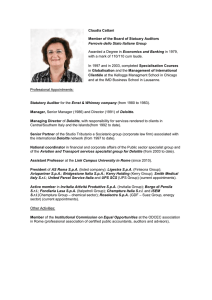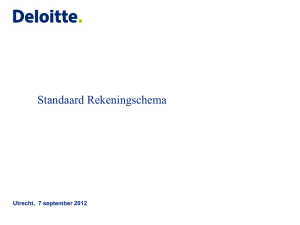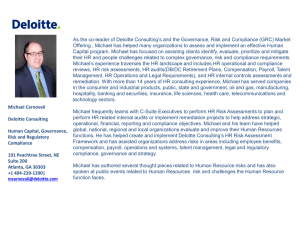519 kb
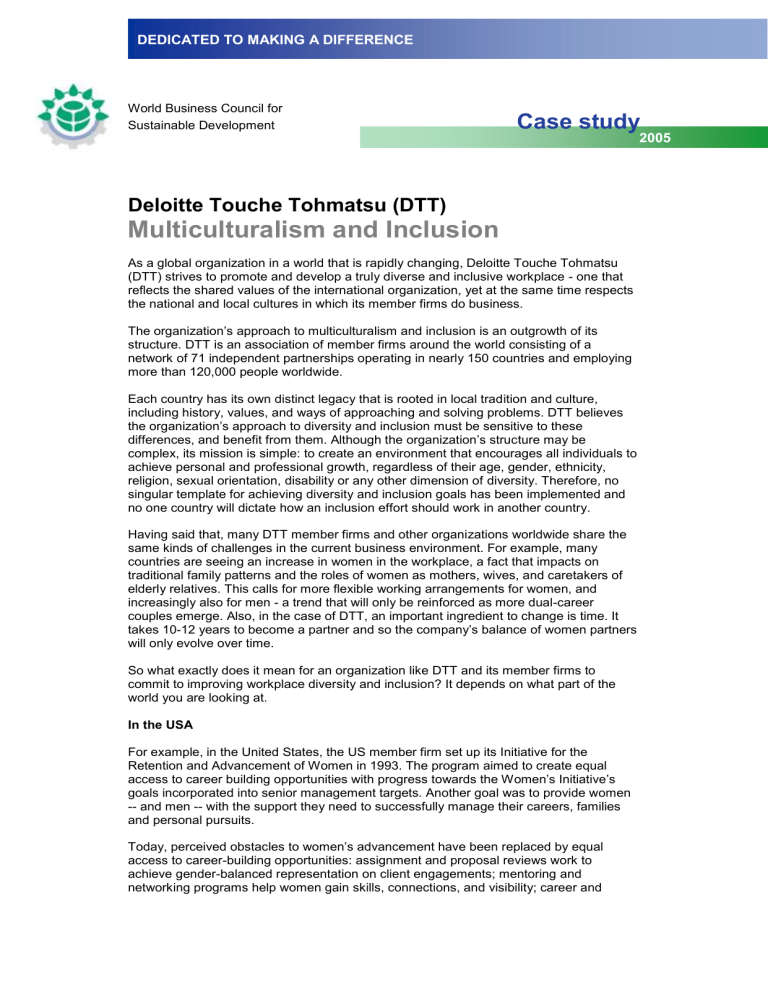
DEDICATED TO MAKING A DIFFERENCE
World Business Council for
Sustainable Development
Deloitte Touche Tohmatsu (DTT)
Case study
2005
Multiculturalism and Inclusion
As a global organization in a world that is rapidly changing, Deloitte Touche Tohmatsu
(DTT) strives to promote and develop a truly diverse and inclusive workplace - one that reflects the shared values of the international organization, yet at the same time respects the national and local cultures in which its member firms do business.
The organization’s approach to multiculturalism and inclusion is an outgrowth of its structure. DTT is an association of member firms around the world consisting of a network of 71 independent partnerships operating in nearly 150 countries and employing more than 120,000 people worldwide.
Each country has its own distinct legacy that is rooted in local tradition and culture, including history, values, and ways of approaching and solving problems. DTT believes the organization’s approach to diversity and inclusion must be sensitive to these differences, and benefit from them. Although the organization’s structure may be complex, its mission is simple: to create an environment that encourages all individuals to achieve personal and professional growth, regardless of their age, gender, ethnicity, religion, sexual orientation, disability or any other dimension of diversity. Therefore, no singular template for achieving diversity and inclusion goals has been implemented and no one country will dictate how an inclusion effort should work in another country.
Having said that, many DTT member firms and other organizations worldwide share the same kinds of challenges in the current business environment. For example, many countries are seeing an increase in women in the workplace, a fact that impacts on traditional family patterns and the roles of women as mothers, wives, and caretakers of elderly relatives. This calls for more flexible working arrangements for women, and increasingly also for men - a trend that will only be reinforced as more dual-career couples emerge. Also, in the case of DTT, an important ingredient to change is time. It takes 1012 years to become a partner and so the company’s balance of women partners will only evolve over time.
So what exactly does it mean for an organization like DTT and its member firms to commit to improving workplace diversity and inclusion? It depends on what part of the world you are looking at.
In the USA
For example, in the United States, the US member firm set up its Initiative for the
Retention and Advancement of Women in 1993. The program aimed to create equal acc ess to career building opportunities with progress towards the Women’s Initiative’s goals incorporated into senior management targets. Another goal was to provide women
-- and men -- with the support they need to successfully manage their careers, families and personal pursuits.
Today, perceived obstacles to women’s advancement have been replaced by equal access to career-building opportunities: assignment and proposal reviews work to achieve gender-balanced representation on client engagements; mentoring and networking programs help women gain skills, connections, and visibility; career and
WBCSD page 2 succession planning programs help them to map their moves to the top; and flexible work arrangements help them achieve work/life balance.
As a result, the percentage of female partners, principals and directors at DTT’s US firm has grown from 6.5% in 1993 to 17.2% in 2004 -- the highest percentage of women partners, principals and directors among the Big Four accounting firms in the US, according to Public Accounting Report‘s 2004 Annual Survey of Women in Public
Accounting. In 1993, the gender gap in turnover was 6.9% and the percentage of women in senior leadership positions was less than 5%. In 2005, there was a 0% gender gap in turnover and women held approximately 19% of senior leadership positions. Today, development programs promote growth for all professionals.
The US member firm also focuses on a wider array of diversity aspects. For example a number of Business
Resource Groups have been created which bring together employees at all levels – from partners to trainees - who have common interests and backgrounds and can support, stimulate, and learn from one another.
There are currently BRGs for groups including African
Americans, Hispanic-Americans, working mothers, gay and lesbian professionals, and others.
In France
In France, Deloitte recruits students and trains them extensively to become auditors and consultants. Over the last decade, the company’s intake has mirrored the university population of roughly 50% women. However, there is a discrepancy in retention rates between women and men, and the proportion of men Partners is significant. Because of this difference, the company aims to promote careers within Deloitte for talented women professionals.
In order to build the business case and define implementation, key figures were captured to identify where efforts need to be made and a regular scorecard has now been established. Concretely:
All human resources processes have been reviewed to ensure equity of treatment between men and women. Implementation of the “Global Excellence Model”, designed to improve accounting for employee’s expectations, renew evaluation processes, and project people into learning and growth, has been key to success.
The work/life balance of employees has been addressed by offering part-time work opportunities, improving maternity coverage, partnering with a childcare services company and creating a concierge service in the office.
Deloitte is actively engaging employees in awareness programs through such activities as being a founding sponsor of the Paris Professional Women Network, which has now been extended to the European Professional Women Network.
Several conferences were organized in the office, or sponsored by Deloitte with keynote speakers.
Consequently, in 2004, more than 95% of the French firm’s women who went on maternity leave resumed work after the birth of their child, finding ways to combine work and new responsibilities at home.
In the United Kingdom
The UK is a pr ofoundly multicultural society, and Deloitte’s workplace reflects that reality.
Instead of a multi-strand approach to diversity, the UK firm focuses on five areas: culture and behavior, flexibility, recruitment, brand and business practices. The emphasis is on using diversity as the driver to effect meaningful change.
WBCSD page 3
Additionally, there has been a shift from a workplace culture that emphasized arriving at the office early and staying late into the evening, a tradition that was a natural outgrowth of a “bill by the hour” imperative. Some called it “presenteeism” - the opposite of absenteeism.
Increasingly, there is acceptance for different working arrangements tailored to people with different needs - such as raising children or caring for elderly parents - and who therefore require more flexibility.
There is also greater acceptance and appreciation for differences in general. In London, for example, the firm supports an individual who is hearing-impaired by investing in customized software that converts the spoken word into text and allows him to communicate effectively in client meetings.
In the Netherlands
I need flexibility too.
The Netherlands presents a significantly different social situation. This is a country in which the immigrant minority population has grown rapidly in a relatively short time, particularly Moroccans, Turks and Surinamese. In response, the firm is developing programs that focus on gender and immigrant issues. These include programs that enhance the recruitment of foreigners, create a women’s network, and establish management development programs that focus on gender and immigrant issues.
In South Africa
In South Africa, Deloitte’s member firm has been working under the framework of a national agenda that strives to overcome the legacy of apartheid and promote social justice, transformation and reconciliation. This does not represent a new approach for
Deloitte SA – the firm has been successfully recruiting black chartered accountants since the 1970s.
Over the last decade, the firm rolled out two national Building on Diversity programs.
They were geared toward enhancing understanding of the diverse ethnic, religious and cultural backgrounds of the entire workforce in order to create a respectful working environment, facilitate the establishment of sound, professional working relationships and encourage open and honest dialogue. Every partner and professional in the SA firm took part in the programs. Their output-driven business strategy requires that all business units perform against a set of rigorous quantitative and qualitative targets.
A number of recruitment, retention and fast-tracking initiatives are also in place to drive the firm to achieve its representation targets. This includes incentives for achievement where a significant part of partn ers’ bonuses are a stake.
A global approach to multiculturalism and inclusion
Since 2004, the DTT executive committee has taken significant action at the global level by formally launching a new multicultural and inclusion initiative. As part of this, the organization is in the process of establishing a task force leadership group that will help set the direction going forward. The member firms are measuring their respect for cultural diversity through a people commitment survey that has already been completed by some
60,000 people in 24 countries. The organization is developing cultural awareness learning programs that create opportunities to openly discuss different cultural perspectives. Networks across practice areas are also being developed so that member firms can learn more from one another.
WBCSD page 4
This is an exciting process, and no matter what the differences are, the bottom line is that
Deloitte Touche Tohmatsu is in the people business, respecting employees and recognizing that they are the organizat ion’s most valuable resource. This commitment to multiculturalism and inclusion is also closely linked to DTT’s commitment to responsible business practices and its global shared values: integrity; outstanding value to markets and clients; commitment to each other; and strength from cultural diversity.
More information
Deloitte Touche Tohmatsu http://www.deloitte.com
About Deloitte
Deloitte refers to one or more of Deloitte Touche Tohmatsu, a Swiss Verein, its member firms, and their respective subsidiaries and affiliates. Deloitte Touche Tohmatsu is an organization of member firms around the world devoted to excellence in providing professional services and advice, focused on client service through a global strategy executed locally in nearly 150 countries. With access to the deep intellectual capital of 120,000 people worldwide, Deloitte delivers services in four professional areas
—audit, tax, consulting and financial advisory services and serves more than one-h alf of the world’s largest companies, as well as large national enterprises, public institutions, locally important clients and successful, fast-growing global growth companies. Services are not provided by the Deloitte Touche Tohmatsu Verein, and, for regulatory and other reasons, certain member firms do not provide services in all four professional areas.
As a Swiss Verein (association), neither Deloitte Touche Tohmatsu nor any of its member firms has any liability for each other’s acts or omissions. Each of the member firms is a separate and independent legal entity operating under the names “Deloitte,” “Deloitte & Touche,” “Deloitte
Touche Tohmatsu” or other related names.
About the WBCSD
The World Business Council for Sustainable Development (WBCSD) is a coalition of international companies united by a shared commitment to sustainable development via the three pillars of economic growth, ecological balance and social progress. Our members are drawn from more than
35 countries and 20 major industrial sectors. We also benefit from a Global Network of 40 national and regional business councils and partner organizations involving more than 1,000 business leaders globally.
4, chemin de Conches
CH – 1231 Conches-Geneva
Switzerland
Tel: +41 (22) 839 31 00
Fax: +41 (22) 839 31 31
E-mail: carpenter@wbcsd.org
Web: www.wbcsd.org

